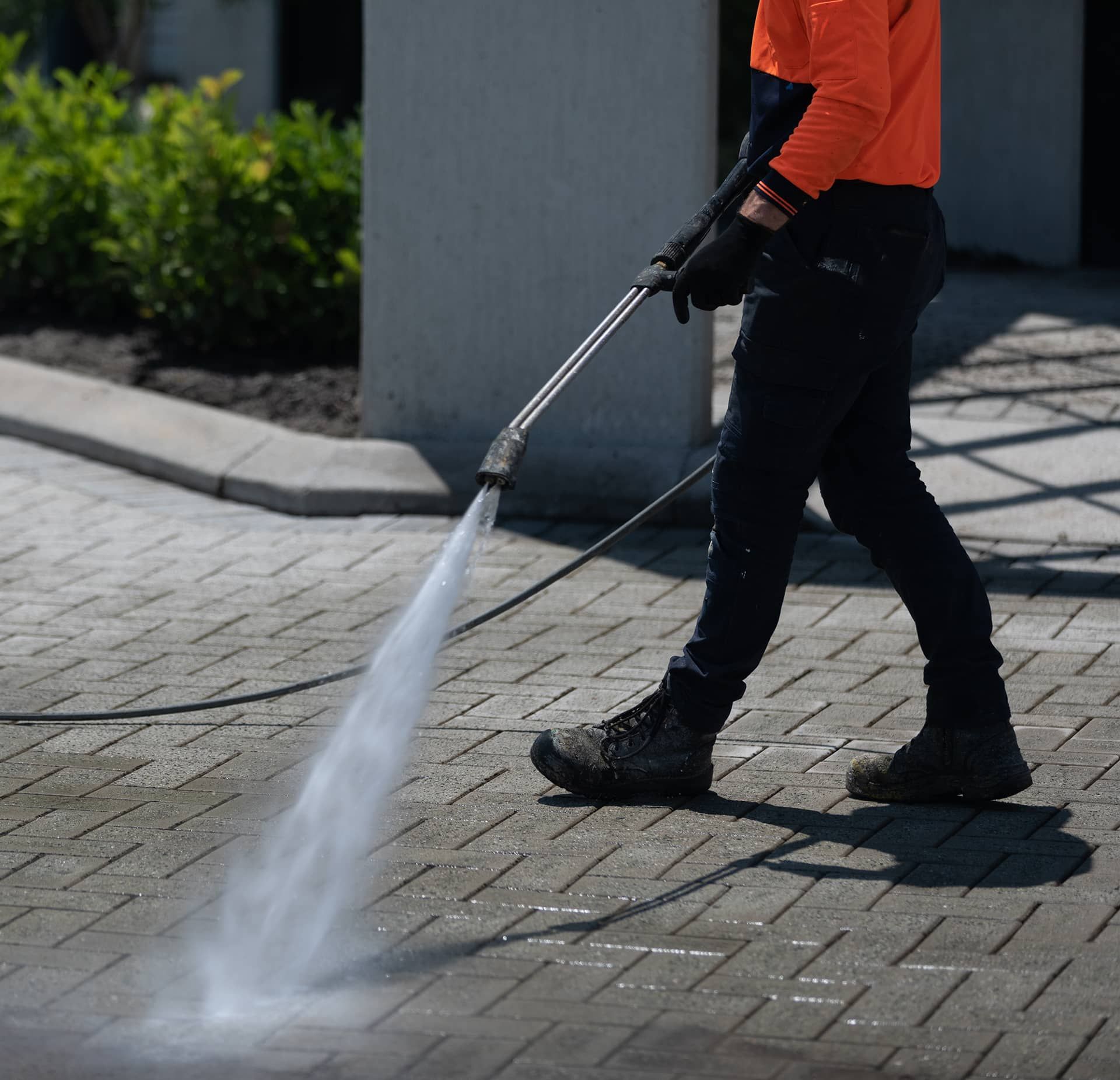Should You Pressure Wash Concrete Pavers? Tips for Cleaning and Sealing
Should You Pressure Wash Concrete Pavers? Tips for Cleaning and Sealing

How to Properly Clean Concrete Pavers: Tips for Pressure Washing
Did you know that clean concrete pavers can boost your home's curb appeal? A stunning 72% of homeowners report this benefit. Let's explore how to pressure wash your pavers effectively.
Pressure washing breathes new life into concrete pavers. It strips away dirt, grime, and stubborn stains. As Long Island's power washing experts, we've seen amazing transformations.
At Super Clean Machine, we've earned a 4.8 Google rating. We serve Nassau and Suffolk County with top-notch cleaning services. Our techniques reveal your property's hidden beauty.
Ready to dive into paver cleaning? Let's discover how to make your outdoor spaces shine.
Key Takeaways
- Regular cleaning prevents moss, weed, and lichen growth on pavers
- Professional cleaning is recommended at least once a year
- Use mild detergents or specialized paver cleaners for best results
- Avoid acidic solutions and wire brushes to prevent damage
- Consider applying sealant to protect pavers from stains and discoloration
- Wear protective gear when using cleaning products or pressure washers
- Inspect pavers for damage during the cleaning process
Understanding Concrete Paver Cleaning Basics
Concrete pavers are popular for outdoor spaces but need regular upkeep. Let's explore paver cleaning essentials, common issues, and necessary tools. Effective maintenance keeps your pavers looking great.
Types of Dirt and Stains on Pavers
Pavers face various challenges that affect their look. Stains can range from oil spots to organic growth. Moss removal is common in damp areas.
Weed prevention is vital to maintain paver joint integrity. Regular cleaning helps tackle these issues effectively.
Benefits of Regular Paver Maintenance
Consistent upkeep of your pavers offers numerous advantages:
- Extends the lifespan of pavers
- Prevents discoloration
- Maintains the aesthetic appeal of your outdoor space
- Reduces long-term repair costs
Tools and Materials Needed for Cleaning
To effectively clean your pavers, you'll need specific cleaning equipment:
- Pressure washer
- Surface cleaner attachment
- Broom and joint scraper
- Paver sealer for protection
- Specialized cleaners for stubborn stains
A sweeper can efficiently remove loose debris before deeper cleaning. The right tools make a big difference in paver maintenance.
Preparing Your Pavers for Pressure Washing
Proper paver prep is key for top-notch pressure washing results. Let's explore the vital steps to get your pavers ready for a thorough clean.
Removing Loose Debris and Weeds
Sweep away loose dirt, leaves, and twigs with a broom or rake. Use a joint scraper or garden hoe to clear out weeds between pavers.
A cordless weed remover can tackle stubborn growths without straining your back. This tool makes the job easier and more efficient.
https://youtube.com/watch?v=65GUhQnR_cs
Pre-treating Stubborn Stains
Apply specialized cleaner to oil spots or rust marks. For an eco-friendly option, try a baking soda and water paste.
Let the paste sit for 15 minutes before scrubbing. Vinegar can effectively remove mineral deposits from your pavers.
Protecting Surrounding Areas
Shield nearby plants with plastic sheeting to protect them from cleaning solutions. Tape off walls and fixtures next to your paver area.
This step prevents accidental damage and keeps your cleaning efforts focused on the pavers. It's a crucial part of the prep process.
Preparation Step Tools Needed Time Required Debris Removal Broom, Rake 15-30 minutes Weed Removal Joint Scraper, Cordless Weed Remover 30-60 minutes Stain Pre-treatment Cleaner, Brush 20-40 minutes Area Protection Plastic Sheeting, Tape 15-30 minutes
You're now ready for an effective pressure washing session. These prep steps will help revitalize your outdoor space and make it shine.
Can You Power Wash Pavers? Effective Techniques
Power washing cleans concrete pavers effectively, but caution is necessary. Use medium-high pressure settings of 2,000 to 3,000 PSI for concrete pavers. For brick or natural stone, lower the pressure to 1,500-2,500 PSI to avoid damage.
Start with high-traffic areas when power washing. Keep the nozzle 12 to 18 inches from the surface. Work with the slope to ensure dirty water runs off properly.
A dirt cutter or rotating nozzle can remove stubborn dirt and growth. These tools are great for cleaning weeds and moss from hard-to-reach spots. For flat areas, use a surface cleaner attachment with a rinsing function.
Paver Type Recommended PSI Cleaning Technique Concrete 2,000-3,000 Medium-high pressure, surface cleaner attachment Brick 1,500-2,500 Lower pressure, dirt cutter for stubborn areas Natural Stone 1,500 or lower Gentle pressure, rotating nozzle for even cleaning Clay 1,500 or lower Careful pressure, pre-treat with cleaning solution
Natural stone pavers usually handle pressure washing well. Concrete or terracotta pavers might be more prone to damage. If you're unsure, ask a specialist about the best cleaning methods for your pavers.
Post-Cleaning Care and Maintenance
Proper maintenance keeps your pavers looking great after power washing. Let's explore essential post-cleaning care steps. We'll also share tips for a regular paver maintenance routine.
Re-sanding Joints and Sealing Pavers
Once pavers are clean and dry, re-sand the joints. Use polymeric sand to prevent weed growth. It hardens when wet, providing better protection.
After re-sanding, apply a quality paver sealer. This protects against stains and enhances the pavers' appearance.
Preventing Future Stains and Growth
To maintain your pavers' pristine look, implement these preventive measures:
- Sweep regularly to remove debris
- Clean spills promptly to avoid staining
- Use absorbent materials like cat litter for oil stains
- Apply moss prevention treatments in shaded areas
- Implement effective weed control strategies
Regular Cleaning Schedule Tips
Keep your outdoor spaces looking their best with a consistent paver maintenance routine:
Frequency Task Weekly Sweep and remove debris Monthly Thorough cleaning with mild detergent Annually Power wash and reseal pavers As needed Spot-clean stains and control weeds
Follow these post-cleaning care tips to extend your pavers' life. A regular cleaning schedule will keep them beautiful for years.
Conclusion
Proper paver restoration is vital for boosting curb appeal and property value. Our Long Island power washing services offer effective concrete paver revitalization. We use deep steam cleaning that uses less water and tackles tough stains.
Regular maintenance prevents long-term damage and costly repairs. We suggest waiting before sealing new pavers and reapplying sealer every 3-5 years. Our team uses appropriate cleaning agents and pressure settings to protect your pavers.
At Super Clean Machine, we focus on eco-friendly practices in Long Island. Our steam cleaning sanitizes without harsh chemicals, preserving pavers and the environment. Our trained professionals will reveal your property's beauty and ensure outdoor space longevity.
FAQ
What types of dirt and stains can accumulate on concrete pavers?
Concrete pavers often collect moss, weeds, and oil spots. Regular upkeep prevents discoloration and prolongs paver life. Timely cleaning keeps pavers looking fresh and new.
What tools and materials are needed for cleaning pavers?
Key tools include a pressure washer, garden hose, broom, and joint scraper. Specialized cleaners help tackle tough stains. For big areas, a sweeper efficiently removes loose debris.
How do you prepare pavers for pressure washing?
Start by sweeping away loose dirt, leaves, and twigs. Remove weeds from gaps using a joint scraper or garden hoe. Apply cleaner or home remedies for stubborn stains.
Protect surrounding areas, including plants and walls, from cleaning solutions. This prevents damage during the pressure washing process.
Can you power wash all types of pavers?
Power washing works well for concrete pavers, but caution is needed. Natural stone pavers can handle pressure washing. For concrete or terracotta pavers, consult a specialist to avoid damage.
What techniques are effective for pressure washing pavers?
Use medium-high pressure and focus on high-traffic areas first. A dirt cutter attachment removes weeds and moss effectively. Keep the nozzle 15 cm from the ground.
Work with the slope to allow dirty water runoff. For flat surfaces, use a surface cleaner with rinsing function.
What post-cleaning care is recommended for pavers?
After cleaning, re-sand joints if needed and consider sealing pavers. This protects against future stains. Sweep regularly and clean spills promptly to avoid stubborn marks.
Set up a cleaning schedule: remove debris weekly and do thorough cleaning monthly. This keeps your pavers looking their best year-round.

